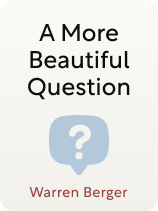

This article is an excerpt from the Shortform book guide to "A More Beautiful Question" by Warren Berger. Shortform has the world's best summaries and analyses of books you should be reading.
Like this article? Sign up for a free trial here.
Are you always that one person in the room who’s asking all the questions? Should you be?
In A More Beautiful Question, author and journalist Warren Berger highlights four fundamental questions: Why, Why not, What if, and How. He calls them “beautiful questions” and contends that they form the basis of larger questions that can help you succeed in life both professionally and personally.
Read more to relearn how to raise the questions you almost certainly asked all the time as a child.
#1: Why?
The first of the four fundamental questions is “why?”. Berger says this is the first type of question you should ask when you’re faced with a difficult or unfamiliar situation. Despite their simplicity, “why” questions have the power to help you understand complicated issues and challenge your assumptions.
For example, most people simply accept that they need to sleep. However, when somebody thought to ask why people need to sleep, it created an entirely new branch of science dedicated to answering that question.
#2: Why Not?
Just as important as “why?” is its counterpart, “why not?” Berger says that asking this fundamental question leads you to try out new ideas and experiment with possible solutions. However, the real power of “why not?” is that it challenges your assumptions about what’s possible and what’s necessary.
To continue the previous example of sleep science, one experiment started with the question, “Why not go without sleep and see what happens?” This question challenges the assumption that sleep is necessary in the first place. It turned out that sleep is necessary, but even that information is something scientists wouldn’t have known for sure without asking an appropriate “why not?” question.
#3: What If?
The third fundamental question is “what if?” Berger says this question helps you break out of your usual patterns of thinking; and, in doing so, you either come up with novel ideas or combine old ideas into something new. In other words, asking “what if?” can help you make connections between thoughts that you haven’t connected before.
For example, the rideshare app Uber came from just such a “what if?” question. Cofounders Garrett Camp and Travis Kalanick got stranded in a snowstorm in Paris, and they wondered: “What if you could use your phone to secure a ride?”
(Shortform note: One major reason “what if?” questions spur your creativity is that they often present you with situations that you’ve never encountered before, meaning that you have no previous experiences to draw on. Therefore, instead of searching through your memories for an appropriate answer, you’re forced to consider new possibilities or look for ways that your existing knowledge could apply to that new situation.)
#4: How?
To turn a creative idea into reality, you need to answer the fourth and final fundamental question: “how?” Berger says this is the most difficult step—fully answering “how?” often requires patience and commitment to your idea because the answers tend to be much more complicated than they seem at first.
Continuing the example of Uber, the co-founders had come up with a new concept: using a phone to secure a ride. However, that concept on its own was worthless—founding the rideshare company that made them billionaires first required them to answer how they were going to do that.
Furthermore, that answer (a relatively simple smartphone app) led to numerous other questions, as Berger says is likely to happen: For instance, how would they compensate the drivers? How could they make riding with strangers as safe as possible? How would they outcompete local taxi services? Fully answering these “how?” questions led Camp and Kalanick to found one of the world’s most successful startup companies.

———End of Preview———
Like what you just read? Read the rest of the world's best book summary and analysis of Warren Berger's "A More Beautiful Question" at Shortform.
Here's what you'll find in our full A More Beautiful Question summary:
- The three fundamental questions you should be asking every day
- How to develop a curious, questioning mindset
- How schools stifle curiosity rather than encouraging it







There are also the “Who” questions – that I believe underpins everything, because they deal with beliefs about my identity.
In particular, “who am I currently being”? and “who do I believe I can be”?
I may be biased though, because I wrote a book about it 🙂
#StartWithWho